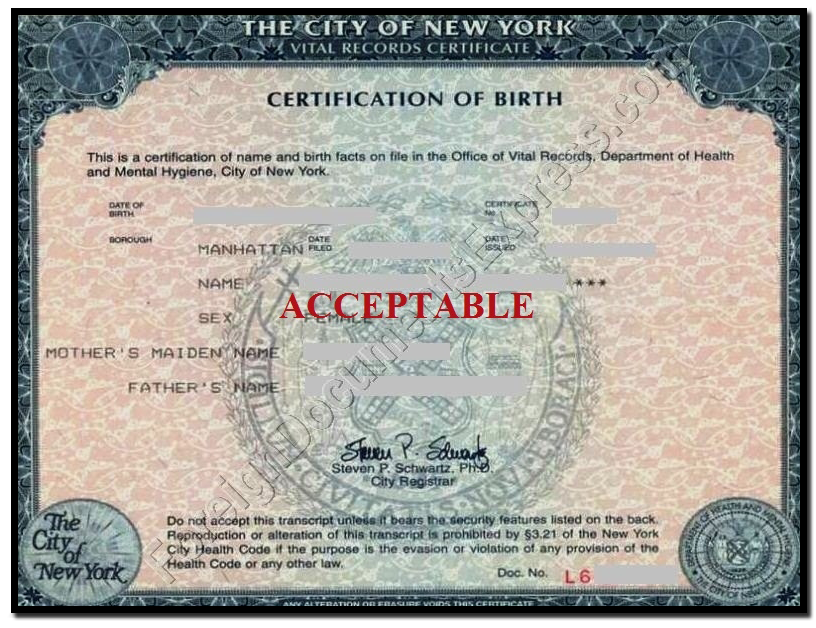There isn’t a day that goes by when Adoption STAR doesn’t process a situation and weigh not only the adoption regulations but also discusses the best practice recommended. One topic that touches upon regulation and best practice is the topic of requiring prospective adoptive parents to submit certain certified documents. Below is an article specifically focusing on the certified birth certificate and its importance.
Certified Documents ~ What, How, Who, and Why?
A birth certificate or a certified copy of an original birth certificate is becoming increasingly important as a required form of identification. A birth certificate is considered valid proof of identification by federal, state and local government agencies. A birth certificate may even be required when applying for some jobs. The federal government does not provide copies of birth certificates, marriage licenses, divorce decrees, death certificates, or any other personal vital records. Copies of birth certificates and other personal vital records can only be obtained from where the documents were originally filed.
What is a Certified Copy of a Birth Certificate?

A certified copy of a birth certificate has a registrar’s raised, embossed, impressed or multicolored seal, registrar’s signature, and the date the certificate was filed with the registrar’s office, which must be within 1 year of the person’s date of birth.
The basic reason why we need to have a birth’s certification is for identity purposes. A certification of birth contains important details that accurately identify the person, the information about the name of the parents, the place, date, and kind of birth and many others that explain in detail about the child’s birth.
In the United States, there are a lot of hospitals that provides a certificate of birth, which is more like a souvenir because it includes a child’s footprint on it. However this type of birth certificate is not honored legally as a proof of citizenship or identity. As a citizen of any country, it is your right to have your own copy of your birth’s certification.
A birth certificate is mostly needed in the following areas:
- School. Every school requires each student to submit a certified birth certificate for their record. This allows the school to verify the accuracy of the information shared with them.
- Passport Application. When you travel internationally you require a passport and it is required to submit a certified birth certificate with the application.
- Social Security Card. A birth certificate original or certified is needed when applying for a social security card and securing the benefits associated with it.
- Marriage License. Applying for a marriage license requires a birth certificate.
- Driver’s License. To apply for a driver’s license, one requires a certificate of birth.
- Insurance. There are companies that require certification of births for people applying for pension plans as well as health insurance.
- Bank Accounts. A certification of birth is one of the many requirements needed when opening up a bank account.
- Adoption. When you apply for adoption, it is necessary to supply certified birth certificates and other certified personal vital documents.
Most transactions that require verification of identify, will require a birth certificate. Securing certified copies of your birth certificate will keep you from the stress of running around to obtain one when the need occurs.
How to Get a Certified Birth Certificate
Most states provide a centralized source from which birth certificates and other vital records can be ordered. Each has its own set of rules and fees for ordering certified birth certificates on other vital records. Rules, ordering instructions and fees for all states, typically can be found on websites for the vital statistics offices. When ordering, be aware that shortened (abstract) versions of birth certificates offered by some states may not be acceptable. Be sure to order only the full, certified copy of the original birth certificate bearing the registrar’s raised, embossed, impressed or multicolored seal, registrar’s signature, and the date the certificate was filed with the registrar’s office.
Who Can Apply for the Birth Certificate?
Only properly qualified applicants (registrant, immediate family member either by blood or marriage or adoption, a guardian, legal agent, or representative) may request a certified copy of the birth certificate.
Why Not a Photocopy of a Birth Certificate?
At a minimum, the request for certified copies is designed to limit tampering, counterfeiting, and photocopying, or otherwise being duplicated, for fraudulent purposes.
Additionally, individuals including notaries are not permitted to provide statements or attestations regarding seeing an original birth certificate and saying they compared it to the photocopy. Only certain states that authorize copy certification/attestation allow the comparison method. Our last research showed that these states are CA—POAs only, CO, ID, ME, MN, MO, MT, NH, ND, OK, PA, VT, WA, WV, WI, WY. So a photocopy, even if certified by a Notary Public, will not be accepted.
While not all domestic adoption agencies have implemented the best practice policy to require the submission of a certified birth certificate, agencies that are dually licensed in other states as well as accredited as an international adoption agency, will require the submission of certified vital documents. The policy to obtain and keep on file a certified copy of birth and marriage certificates (divorce certificates and death decrees, if applicable as well) follows the standards developed and set forth for official purposes by Federal agencies and is deemed “best practice.”
In conclusion, we will borrow the words of the DMV.org site, which states: The importance of possessing a certified copy of your birth certificate cannot be overemphasized. This is the Mount Everest of personal identification.
Read More on What is Happening at Adoption STAR: Our Calendar of Events for 2013
